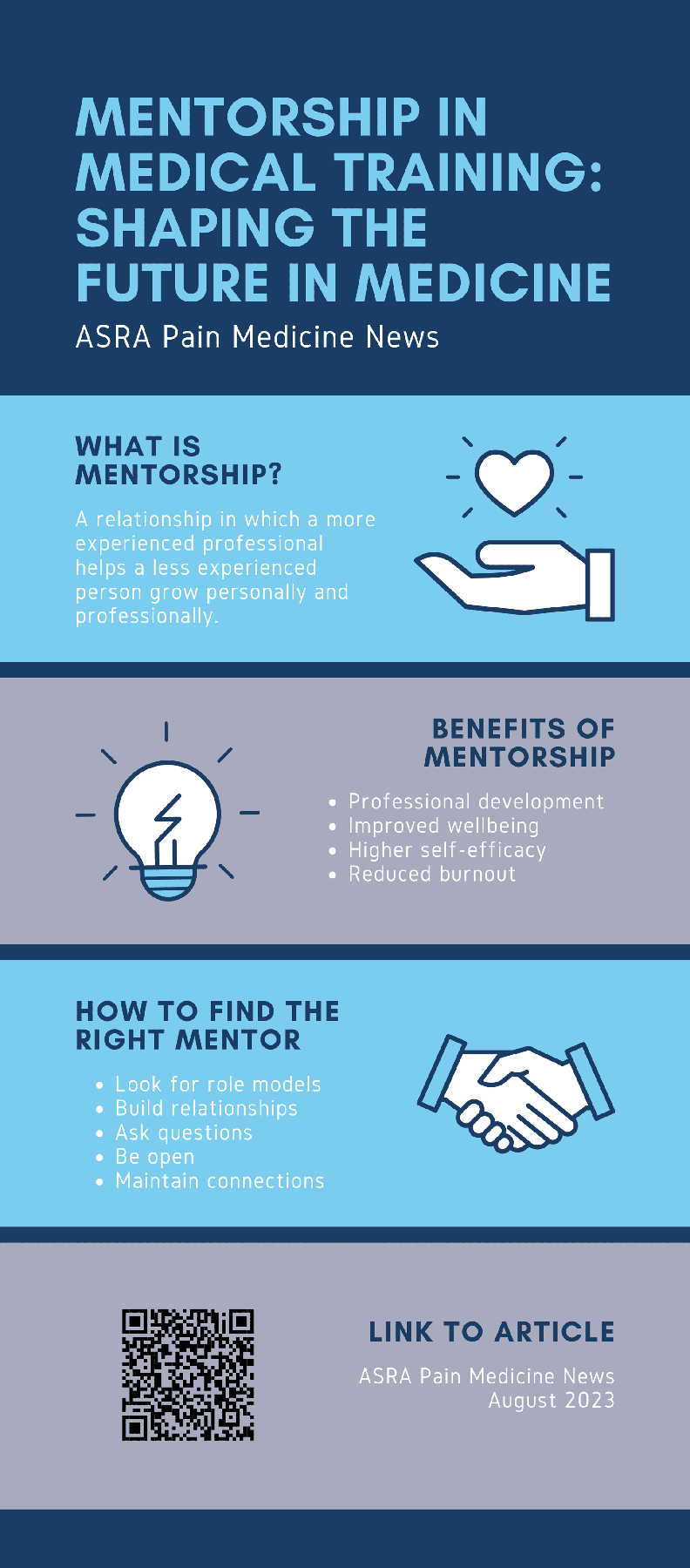Mentorship in Medical Training: Shaping the Future in Medicine
Cite as: Vankka N, Ip V. Mentorship in medical training: shaping the future in medicine. ASRA Pain Medicine News 2023;48. https://doi.org/10.52211/asra080123.008.
The Meaning and Significance of Mentorship: A Two-Way Street
The pursuit of a career in medicine is inevitably characterized by successes, challenges, and questions every step of the way. It is invaluable for trainees to have a point of contact to help guide them through challenges and share in the excitement of their successes. The Canadian Medical Association defines mentorship as “a relationship in which a more experienced professional (the mentor) helps someone newer to the field (the mentee) grow both personally and professionally.”1 Mentorship is widely recognized as an important component of medical training and is beneficial for both the mentee and the mentor.
Several studies have demonstrated that the implementation of mentorship programs throughout medical training improved satisfaction in medical school, career development, and professional development as well as increasing the overall well-being and self-efficacy in trainees.2-6 Additionally, there is evidence indicating effective mentorship can reduce burnout, which is a prevalent issue in the medical field.7,8 Benefits to mentors included a high level of personal satisfaction and a sense of fulfillment from giving back to their profession.9,10 Further, enhanced research productivity was noted as an additional benefit for both mentors and mentees when a successful mentor-mentee relationship is developed.5,10 The mentor-mentee relationship can reach its full potential when mentees are open to feedback and take responsibility for their own learning and development with support from their mentors. Likewise, when mentors are willing to accept constructive and objective feedback and adjust their mentorship styles, the learning experience will be enhanced for mentees.

Formal Versus Informal Mentorship
Mentorship may be formal or informal. Formal mentorship occurs when the mentor and mentee are assigned to one another by a third party, such as the medical school.11 Informal mentorship occurs when a mentor-mentee relationship forms naturally, often due to shared interests.11,12 In the organizational setting, some studies have suggested informal mentorship may be more effective than formal mentorship to a small degree, but formal mentorship is still very beneficial.13 This may be because informal mentorships often develop because of shared interests and a mutual respect between the mentor and mentee. As a result, the mentor and mentee may share identity characteristics and develop a more trusting relationship, leading to reports of increased satisfaction.14 Other studies evaluating formal and informal mentoring have shown both to be constructive for a mentee.13-15 In a survey of internal medicine residents, Cohee et al. (2015) found mentor-mentee relationships were similar in quality for those who were formally assigned mentors and those with informal relationships that developed naturally.15
Formal medical school mentorship programs vary in their approach. Mentees may meet with their mentors one-on-one, in groups, or both, and the frequency of meetings varies in different programs.2 Mentor-mentee pairings may be selected randomly, matched based on survey responses, or directly chosen by the mentee. Frei et al. (2010) examined 14 formal medical school mentorship programs in the United States and concluded that one-on-one meetings and opportunities for collaborative research between mentors and mentees were features of the most successful mentorship programs.2,5 The most effective mentor-mentee relationships were developed when goals and expectations were clearly established and when mentors and mentees shared similar interests.5,16 Successful collaboration with mentees was more likely when mentors provided non-judgemental guidance.2 Effective mentors often exhibit the characteristics of being trustworthy, approachable, enthusiastic, and capable of adapting their teaching style according to the needs of the learner.16,17
The Process of Developing the Mentor-Mentee Relationship
Finding the right mentor in medical school can be challenging.18 Many medical schools offer formal mentorship programs to help students find mentors, but trainees can also benefit from finding mentors outside of such programs. The former is a more guaranteed process with the drawback of personality or learning/teaching style mismatch or dissimilar interests between the mentor and mentee. The first step in developing a successful mentor-mentee relationship is to determine what you (the trainee) are looking for in a mentor, what you are hoping to learn from your mentor, and understanding how this can change as one progresses through medical training.19
For example, early on in medical school, it may be most beneficial to find a mentor who can help you determine what specialties you may be interested in and potential career paths.18 Once you have defined your interests, it would be advantageous to seek out a mentor who has built a career in your desired specialty and can provide more specific guidance.18 Bhartiya and Ichhpujani (2013) suggested personal credibility and accessibility are two important attributes to look for in a prospective mentor and recommended choosing someone who has expertise in your field of interest.19 It may also be helpful to speak to past mentees about their experiences with a potential mentor.19 Additionally, trust, honesty and openness to feedback are essential for developing a successful mentor-mentee relationship. The Association of American Medical Colleges developed five tips to help medical trainees find mentors who can help them succeed.20
- Look for role models you admire and would like to learn from.
- Build relationships with physicians who are potential mentors as you shadow, volunteer, and work.
- Ask questions to learn about your mentor’s path in medicine, challenges they have experienced, lessons learned, and strategies to overcome hurdles.
- Be open to learning from multiple mentors as different mentors have different strengths and may offer diverse points of view.
- Maintain the connection with early mentors as you progress through medical training and find new mentors.
Personal Experience
Reflecting on my own experience with a mentor prior to starting medical school, I recognize our relationship developed informally during my undergraduate studies and was based on shared interests. My mentor suggested academic opportunities I had not previously considered which led me to undertake post-graduate training in his department. During this time, his one-on-one mentorship was invaluable, and it helped me progress academically and develop personally. He was supportive and engaged and consistently challenged me to be creative by thinking in an unconventional manner. His approach to teaching involved asking leading questions to guide my direction but still required me to find answers and reach conclusions on my own. He demonstrated the attributes of an excellent mentor as he was always supportive of my goal to attend medical school, and he helped me develop problem-solving skills that will continue to benefit me as a future physician. Additionally, he was approachable and honest and provided constructive feedback. Our successful mentor-mentee relationship led to enhanced research productivity for his department, and it inspired me to pursue and complete graduate studies.
As a medical student at the University of Alberta, I benefit from a formal one-on-one mentorship program that pairs each medical student with a practicing physician mentor, who supports the student through the four years of medical school. The program mandates periodic check-ins to discuss student achievement, effective study techniques, access to support, and overall well-being. Not only does the program provide support for students as they adjust to medical school and progress through their training, but it also affords them the opportunity to connect with practicing physicians and gain from their longer-term perspective. Additionally, I have had opportunities to shadow my mentor, which has provided exposure to his specific field. While I have personally found the formal mentorship program beneficial, the random pairing of mentor and mentee could render a poor match, leading to a less meaningful relationship.
I look forward to continuing to build relationships with a variety of mentors during my medical training, and I am excited to mentor medical students and trainees one day as a practicing physician. My positive experiences as a mentee confirmed the impact an effective mentor can have on academic and career aspirations. It has been very beneficial for me to have people I can trust and look to for guidance while navigating academic challenges and determining my career path.
Conclusion
Medical training is demanding, and mentorship plays a vital role in providing trainees with support and guidance to help them develop into balanced and competent physicians. Additionally, it provides mentors with the satisfaction that comes from contributing to their profession and refines their teaching skills. Both formal and informal mentor-mentee relationships have proven to be beneficial, and each presents unique strengths and drawbacks. While formal mentorship programs ensure each mentee will find a mentor, informal mentorship may allow for better alignment of interests and personality traits between mentor and mentee, leading to a more fulfilling relationship. In my experience, both formal and informal mentors have helped shape my development and clarify my goals. My mentors helped me learn to think creatively and critically while learning how to adapt to challenging situations. They have demonstrated the impact a supportive and caring mentor can have on a mentee and have inspired me to mentor others in the future. Mentorship throughout medical training contributes to the growth and development of incoming physicians and, as a result, shapes the future of medicine.
Natalie Vankka, BSc, PhD, is a CA2 (year 2 medical student) at the University of Alberta Faculty of Medicine & Dentistry in Edmonton, Canada.
Vivian Ip, MBChB, FRCA, is a clinical professor at the University of Alberta Hospital, in Edmonton, Canada
References
- Canadian Medical Association. Mentorship in health care. https://www.cma.ca/physician-wellness-hub/topics/mentorship-health-care. Accessed May 23, 2023.
- Atlas AM, Seltzer ES, Watters A, et al. A global perspective of mentorship in medical schools: Systematic review from 2014 to 2019.Med Sci Educ 2021;31:969-77. https://doi.org/10.1007/s40670-021-01252-8
- Farkas AH, Allenbaugh J, Bonifacino E, et al. Mentorship of us medical students: a systematic review.J Gen Intern Med 2019;34:2602-09. https://doi.org/10.1007/s11606-019-05256-4
- Feldman MD, Arean PA, Marshall SJ, et al. Does mentoring matter: results from a survey of faculty mentees at a large health sciences university.Med Educ Online 2010;15. https://doi.org/10.3402/meo.v15i0.5063
- Frei E, Stamm M, Buddeberg-Fischer B. Mentoring programs for medical students—a review of the pubmed literature 2000-2008.BMC Med Educ 2010;10:32. https://doi.org/10.1186/1472-6920-10-32
- Sambunjak D, Straus SE, Marušić A. Mentoring in academic medicinea systematic review.JAMA2006;296:1103-15. https://doi.org/10.1001/jama.296.9.1103
- Hollman D, Ip V. How to heal the physician: wellness begins at medical school.ASRA Pain Medicine News2023;47. https://doi.org/https://doi.org/10.52211/asra020123.014
- IsHak W, Nikravesh R, Lederer S, et al. Burnout in medical students: A systematic review.The Clinical Teacher2013;10:242-45. https://doi.org/https://doi.org/10.1111/tct.12014
- Flexman AM, Gelb AW. Mentorship in anesthesia.Curr Opin Anaesthesiol 2011;24:676-81. https://doi.org/10.1097/ACO.0b013e32834c1659
- Keyser DJ, Lakoski JM, Lara-Cinisomo S, et al. Advancing institutional efforts to support research mentorship: A conceptual framework and self-assessment tool.Acad Med 2008;83:217-25. https://doi.org/10.1097/ACM.0b13e318163700a
- Bhatnagar V, Diaz S, Bucur PA. The need for more mentorship in medical school.Cureus 2020;12:e7984. https://doi.org/10.7759/cureus.7984
- Mohtady HA, Könings KD, van Merriënboer JJG. What makes informal mentorship in the medical realm effective? Mentoring & Tutoring: Partnership in Learning 2016;24:306-17. https://doi.org/10.1080/13611267.2016.1252111
- Inzer L, Crawford C. A review of formal and informal mentoring.Journal of Leadership Education 2005;4:31-50. https://doi.org/10.12806/V4/I1/TF2
- National Academies of Sciences, Engineering,, Medicine: The Science of Effective Mentorship in STEM. Washington, DC: The National Academies Press, 2019.
- Cohee BM, Koplin SA, Shimeall WT, et al. Results of a formal mentorship program for internal medicine residents: Can we facilitate genuine mentorship?J Grad Med Educ 2015;7:105-8. https://doi.org/10.4300/JGME-D-14-00315.1
- Sng JH, Pei Y, Toh YP, et al. Mentoring relationships between senior physicians and junior doctors and/or medical students: A thematic review.Med Teach 2017;39:866-75. https://doi.org/10.1080/0142159X.2017.1332360
- Mian A. True mentorship in medicine.Can Fam Physician 2011;57:252.
- Matthews A. How to find a mentor in medical school. American Osteopathic Association. https://thedo.osteopathic.org/2022/01/how-to-find-a-mentor-in-medical-school. Published January 12, 2022. Accessed May 23, 2023.
- Bhartiya S, Ichhpujani P. How to choose a mentor?J Curr Glaucoma Pract 2013;7:128-9. https://doi.org/10.5005/jp-journals-10008-1150
- Association of American Medical Colleges. 5 tips for finding and working with a mentor. https://students-residents.aamc.org/choosing-medical-career/5-tips-finding-and-working-mentor. Accessed May 23, 2023.

